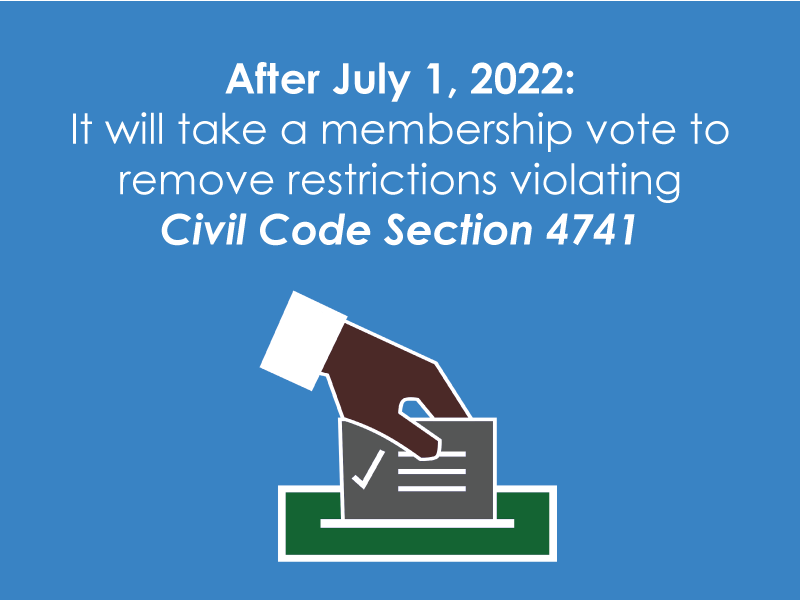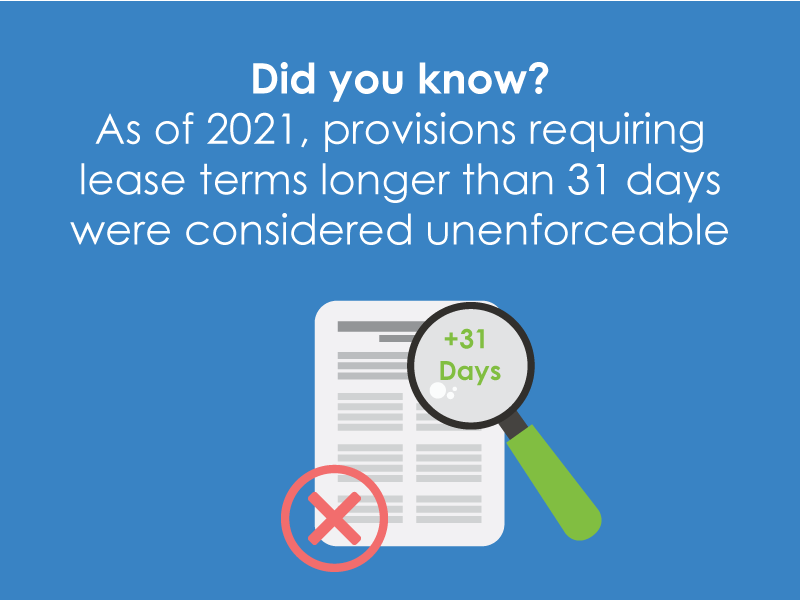Time is almost up for California condos and HOAs that still have dated rental restrictions in place. The California Legislature has enacted several pieces of legislation that now prevent an association’s governing documents from enforcing unreasonable rental rules on owners.
The goal of this new legislation is to balance the needs and values of residential communities with those of individual owners. While most of the new rules came into effect on January 1, 2021, associations have until July 1, 2022, to make the necessary changes.
Why has California made these changes?
Short-term rentals can be beneficial to both owners and guests. Visitors can find a more comfortable place to stay and live like a local, while owners have an opportunity to earn some extra revenue. But, if guests are not respectful of the property or the neighbors, these types of arrangements can turn sour fast.
The state of California wants to ensure that HOAs aren’t being too restrictive when it comes to rental rules, but by no means is it lifting all rules either. Most HOAs don’t have restrictions violating the legislation, and associations still have the ability to impose reasonable rental restrictions.
Civil Code Section 4741
Assembly Bill 3182 was first introduced in 2020 as a way to help combat the housing and homelessness crises in California.
California has some of the nation’s wealthiest neighborhoods. But (perhaps unsurprisingly) on the other end of the spectrum, homelessness has become the top issue in political races. The middle class and lower income individuals are putting pressure on governments to act faster. Housing, an essential item, is harder and harder to afford. California reported 161,548 unhoused people in the state in January of 2020. But it is very likely that the number has increased over the past two years. The report does not account for people who are hidden from public view or who don’t have their own home but are able to sleep on someone’s couch. At least 113,660 of those counted were classified as unsheltered, making California home to more than half of all people without shelter in America.
While it won’t fix this crisis, AB 3182 aimed to prevent unreasonable rental restrictions from being enforced. It had the potential to make hundreds of homes available to renters who may have been unable to access more affordable housing due to stringent association rules.
The Bill, which was passed in the fall of 2020, made it so associations would have to raise the rental cap to at least 25%. That means in a neighborhood with 100 homes, at least 25 owners could rent their homes, provided 25 members wanted to do so. Furthermore, HOAs could no longer require renters to sign rental agreements of one or two years. The minimum requirement was dropped to 31 days.
The Bill still left some gaps though. The issue of “unreasonably restricting” rentals was vague, and the language would likely have caused more conflict within communities. Civil Code Section 4741 was made to bring additional clarity to this issue. An amended version of the Civil Code took effect on January 1, 2022.
The important parts are outlined below, but it’s worth mentioning that new law made it so HOA boards could remove restrictions violating the statute from their governing documents and amend CC&Rs without a membership vote. As anyone who has served on a board knows, changing CC&Rs is not an easy process. The purpose of this was to make it as easy as possible for communities to comply with the changes, but the window for making the change without membership support started on January 1, 2022, and ends on July 1, 2022. The board meeting must be held in an open session, and the proposed amendment must be announced to the membership at least 28 days before the amendment is approved by the board. Finally, the board must allow for comments from members on the proposed amendment.

If you’ve just found out that you need to make these changes to your CC&Rs, it’s too late to do so without a membership vote (there are fewer than 28 days before July comes). But, you can still get support from owners to remove any rental restrictions violating Civil Code Section 4741. We strongly advise you to speak to your attorney as soon as possible if you have concerns about the new rental restriction laws.
What restrictions are no longer legal?
As of July 1, 2022, Civil Code section 4741 provides that associations cannot have restrictions in their governing documents, or make amendments to the governing documents, that prohibit or unreasonably restrict “the rental or leasing of any of the separate interests, accessory dwelling units (ADUs), or junior accessory dwelling units (JADUs) in the HOA to a renter, lessee or tenant.”
Rental caps cannot be lower than 25%
Restrictions capping the number of rentals to less than 25% are no longer permitted. Caps can be 25%, 30%, etc.
Prohibitions on short-term rentals have been altered
Condos and HOAs can still ban short-term rentals and stop unruly parties from impacting the community. However, owners can now create valid rental agreements lasting 31 days or longer. They are not required to rent out units for a minimum of six months or one year.

ADUs and JADUs are not considered separate interests if the owner lives in one of the units
Accessory dwelling units or junior accessory dwelling units are not counted as a separate interest provided that the owner is living in one of the units. That means if an owner was living in a home, and wanted to rent out a vacant dwelling on their property, this would not count toward the rental cap. Similarly, the owner could legally rent out the ADU to someone for a weekend, even if there is a ban on short-term rentals.
Consequences of ignoring the new laws
HOAs are expected to comply with the new laws right away, even if the changes have not yet been made to CC&Rs. “A common interest development that willfully violates this section shall be liable to the applicant or other party for actual damages, and shall pay a civil penalty to the applicant or other party in an amount not to exceed $1,000.” In other words, an HOA may be required to pay an owner up to $1,000, plus any financial loss suffered by the owner, if it tries to impose illegal rental restrictions on them.
Conclusion
The decision to relax some of the more restrictive rental rules was not supported by all HOA members. Some are worried that bringing in more short-term renters will lead to a devaluation of the development. While this is a valid concern, it is only likely to happen if owners are careless about who they invite into their homes. Renters should be properly screened, and owners have an obligation to ensure their tenants are aware of the rules.


